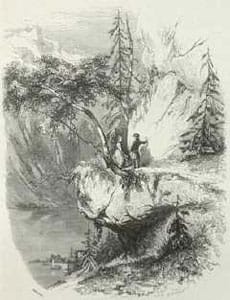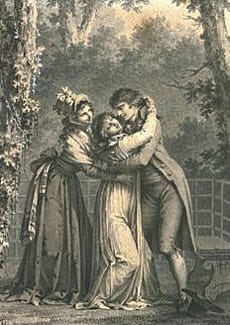Là-haut sur la montagne
Aimer n'est pas un crime; Dieu ne le défend pas.
This song is NOT the one also known as “Le vieux chalet,” a song all too omnipresent on Youtube.
Nowhere do I find exactly the melody I learned. There is one recording offered at Patrimoine-Oral.org, with a very different melody from the one I know (scroll down to the bottom of the page to access the audio file). A bit closer is this one, offered by Raddo-Ethnodoc.com. According to this last site, the locale of the recording is Mieussy, in the Haute-Savoie, which is to say the French Alps.
The song certainly has a mountain setting. The two lovers in the song have much in common with the hero and heroine of Rousseau’s alpine love story Julie, ou la Nouvelle Héloise (1761).
Literary Subjunctive: le subjonctif éventuel
Stanza 2 contains a wonderful example of the pluperfect subjunctive serving in both clauses of conditional sentence “of the third kind,” that is, past contrary-to-fact:
Il nous eût fait un cœur de pierre / S’il eût voulu…
– which is the equivalent of:
Il nous aurait fait un cœur de pierre / S’il avait voulu…
For more on the literary subjunctive tenses, see the Language files on their Formation and their Uses.
French Lyrics (English Translation Follows)

1 Là-haut sur la montagne,
J’ai entendu pleurer.
C’était la voix de ma maîtresse,
Je suis monté la consoler.
2 “Eh ! Qu’avez-vous la belle,
Qu’avez-vous à pleurer ?
– Ah ! Si je pleure, c’est de tendresse,
Et de regret d’avoir aimé.
3 “Aimer n’est pas un crime,
Dieu ne le défend pas.
Il nous eût fait un cœur de pierre
S’il eût voulu qu’on n’aimât pas.1

4 “Les moutons dans la plaine
Sont en danger du loup,
Mais vous et moi, jeune bergère,
Nous somm’s en grand danger d’amour.2
5 “Les moutons vivent d’herbe,
Les papillons de fleurs,
Mais vous et moi, jeune bergère,
Pourquoi n’y vivre qu’en langueur?”3
The 6th stanza:
The above five stanzas (not entirely coherent towards the end, I admit) were what I learned. Online I find this sixth one, which I am suspicious of because it doesn’t stick to the rhyme scheme of the others (and also because of its feeble content):
6 Il y a trois choses au monde,
Trois choses à désirer,
Or, ni argent, mais paix sereine,
Une épouse et du bon vin.
I also find a seventh, which I will not give because it totally wrecks the metrics.4
French Lyrics With English Translation
| 1 Là-haut sur la montagne, J’ai entendu pleurer. C’était la voix de ma maîtresse, Je suis monté la consoler. | 1 Up there, on the mountain, I heard (someone) weeping. It was the voice of my beloved; I climbed up to console her. |
| 2 «Eh ! Qu’avez-vous la belle, Qu’avez-vous à pleurer ? – Ah ! Si je pleure, c’est de tendresse, Et de regret d’avoir aimé. | 2 Say, what’s the matter, lovely one, What do you have to weep about? –Ah, if I weep, it’s from tenderness, And from regret for having loved. |
| 3 «Aimer n’est pas un crime, Dieu ne le défend pas. Il nous eût fait un cœur de pierre S’il eût voulu qu’on n’aimât pas. | 3 To love is not a crime; God does not forbid it. He would have given us hearts of stone If he had wanted us not to love. |
| 4 «Les moutons dans la plaine Sont en danger du loup, Mais vous et moi, jeune bergère, Nous somm’s en grand danger d’amour. | 4 The sheep in the plain Are in danger of the wolf; But you and I, young shepherdess, Are in great danger of love. |
| 5 «Les moutons vivent d’herbe, Les papillons de fleurs, Mais vous et moi, jeune bergère, Pourquoi n’y vivre qu’en langueur?» | 5 Sheep live on grass, Butterflies on flowers; But you and me, young shepherdess, Why should we live there but in languidness?5 |
The dubious 6th stanza:
| 6 Il y a trois choses au monde, Trois choses à désirer, Or, ni argent, mais paix sereine, Une épouse et du bon vin. | 6 There are three things in the world, Three things worth desiring: Neither gold nor silver, but peace serene, A wife, and……some good wine! |
In this 6th stanza we have abandoned the Rousseau-like ambiance for sentiments reminiscent of the Rubaiyat of Omar Khayyam.4
- “eût fait…eût voulu…aimât” – Two pluperfect subjunctives, standing in for the more prosaic past conditional and pluperfect indicative (aurait fait, avait voulu), followed by an imperfect subjunctive (normal in historical sequence).[↩]
- I have to admit that the sentiments expressed in stanzas 3-5 do not form a very coherent whole. (Is it a good thing or a bad thing to be in danger of love?) [↩]
- ???? Meaning, since sheep live on grass, and butterflies on flowers, we lovers shouldn’t live in a sickly way, but on… on… ??[↩]
- It turns out there are even more of these offending stanzas. In this post at the site Dastum 44 (an outfit that promotes the patrimoine culturel immatériel of the Loire-Atlantique [not exactly a mountainous district]) there is a version of nine stanzas, the first five pretty much like mine: devoted to love, and the remaining four sounding like a drinking song. Myself, I prefer to think we have a mash-up here of two different sets of lyrics.[↩][↩]
- The French of this line is about as bad as the English translation. (Among other problems, just what is the “y” referring to?) [↩]


Is there any way to find this song ?
My father passed away and he sang it. I would to play it for his funeral.
So far I have not been able to find a recording of this song online. The obvious course of action is for me to record it myself, which alas means that you will have to listen to me. However, I undertake to do that one of these days soon. (Assuming your are not thinking of the song also known as “Le vieux chalet.”)
I don’t speak French so I’m not positive it’s an exact rendition of the outlined song, but Kronos Quartet and Olivia Chaney have one on spotify.
I find on Youtube by these artists a song by the name of “Montagne, que tu es haute.” Words are here. It sounds nice, but it’s not the song I’m talking about here. (Both songs do refer to the beloved as “ma maîtresse.”)
My dad sang this song…along with hundreds of others. He loved singing « chansons à répondre » or what is now called « chansons trads ». I have it recorded. Of course as expected with oral history the verses aren’t exactly the same.
I sing it as a lullaby now to my grand baby when I rock him to sleep.